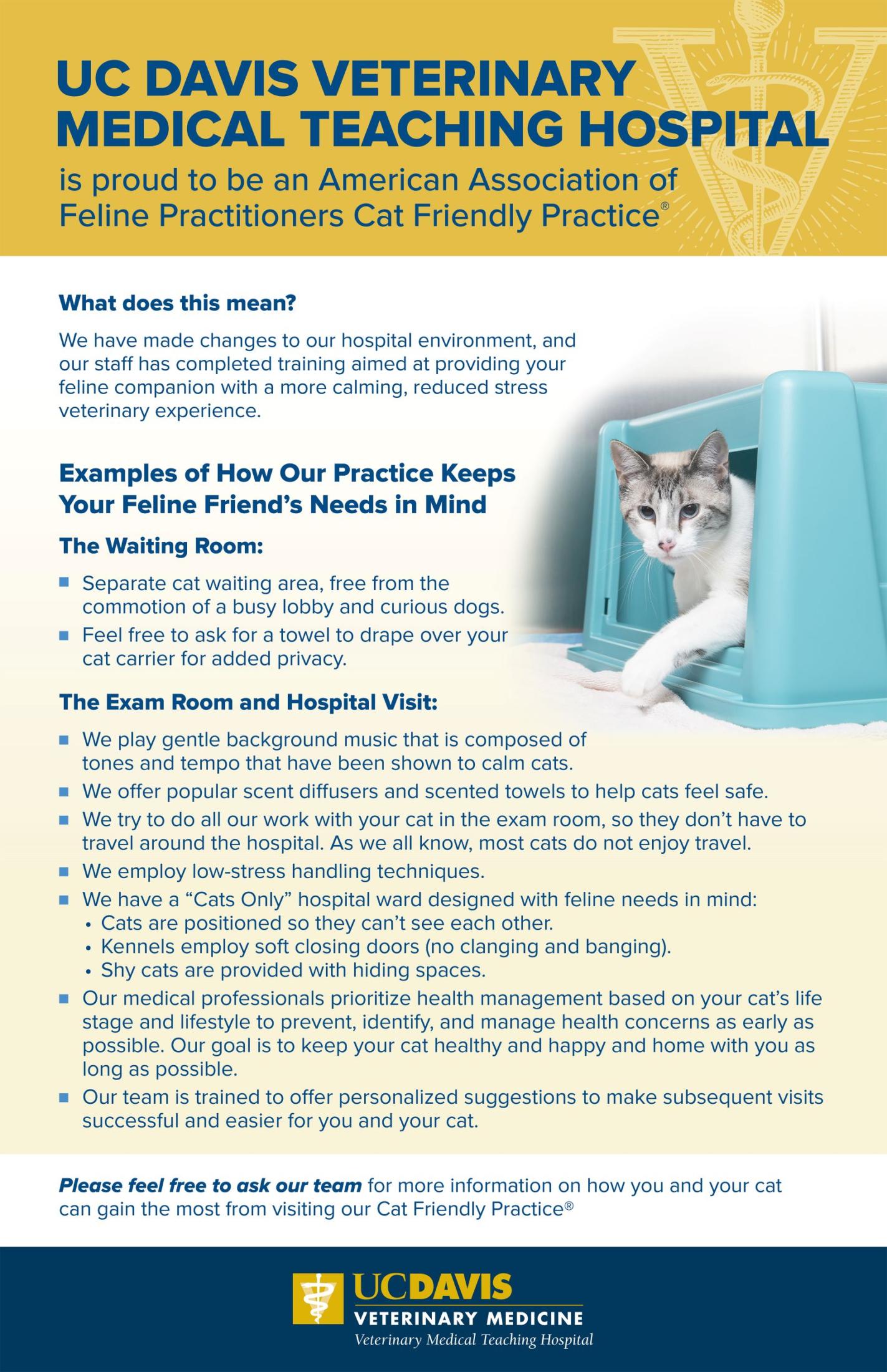Contact
Primary Care Service
Telephone: (530) 752-1393
Location:
UC Davis Health Science District
VMTH
1 Garrod Drive
Davis, California 95616
Primary Care Service
Welcome to the Primary Care Service at the UC Davis Veterinary Medical Teaching Hospital. Thank you for trusting us with your pet's care and supporting student learning! The mission of the service is to provide high-quality, compassionate veterinary care as your pet's primary care provider from the time your pet joins your family through all stages of life. We are a full-service veterinary clinic within the Veterinary Medical Teaching Hospital, offering routine veterinary care for dogs and cats and providing our fourth year veterinary students the opportunity to gain experience with these cases.
Primary Care Services include:
• Annual examinations and preventative care including vaccinations, parasite control, proper nutrition, oral health, pain management, and behavioral recommendations
• New puppy and kitten evaluations
• Treatment for outpatient illnesses and injuries
• Weight management consultations
• Outpatient small mass removal surgeries
• Dental cleaning and dental extractions
• Senior pet care

What To Expect
The senior veterinary student assigned to your case may phone you the day prior to your visit to review a preliminary case history. Upon arrival, you and your pet will be met by one of our senior veterinary students who will gather your pet's medical history and let you know what care your pet is due for today. The student will then perform a physical exam. The student will then consult with one of our clinicians who is involved in your pet's medical care. The clinician will also conduct a thorough physical exam. After assessment, we will discuss a complete care plan and together we can determine the best next steps for your pet and family.
This thorough approach, providing an essential learning process for our senior veterinary students means that your appointment may take longer than it would at a traditional primary care clinic. Please expect a minimum of 90-120 minutes for routine visits and longer if your pet needs more care.
The Primary Care Service is a family practice and if an extensive work-up is needed, a follow-up visit on a subsequent day might be required. If your intention is to seek a referral to the VMTH for specialty care, please contact that service directly. Our primary care practice has the same referral relationship with specialist services as your local, primary care veterinarian.
If your pet has urgent medical needs please contact the emergency hospital closest to you.
Pet Health Information Sheets
Frequently Asked Questions
- I have missed the last two months of heartworm preventive for my dog. Do I need to bring him in for a test before I restart his medication?
- No, simply restart his medication. Your dog should then be tested six to 12 months after restarting the medication.
- Do I need to get my cat vaccinated, even though it never goes outside?
- Although some diseases are only transmitted by direct contact between animals, some infectious diseases can be spread indirectly (in other words, a person who has contact with a sick cat can inadvertently take home an infectious disease on his or her clothing and transmit that disease to their own cat). Also, some indoor cats may interact with outdoor cats through window screens, providing exposure to infectious diseases. Lastly, because of the possibility of indoor cats occasionally getting outside, the current recommendation is that all cats should be vaccinated against Rabies, feline viral Rhinotracheitis, Calici virus and Panleukopenia.
- I am moving to another country and want to take my pet with me. What do I need to do?
- The best thing to do is to research the requirements well in advance of your move since many countries have numerous requirements for animal importation. Information is typically available on government websites (your destination country) or you may find information on the USDA website as well. Allow plenty of time since there are often rabies vaccination, blood tests, microchip and other requirements that must be done in a specific timeline.
- I have noticed that my indoor cat has gained weight and even though I feed her the amount recommended on the bag, she seems to keep gaining weight. What can I do?
- Decreased activity and readily available food have led to increases in our pets' weight and we are now seeing obesity in epidemic proportions in our companion animals. While there may be some medical reasons for weight gain, the most common reason is over-feeding. We are happy to make specific recommendations and develop a weight loss plan for your pet, or refer you to our Nutrition Service's Healthy Weight and Nutrition Clinic. One simple suggestion is to change to feeding fixed amounts two to three times each day, rather than leaving a large bowl of food that is available for your cat whenever she wants. By feeding her measured, limited amounts at set times, your cat may actually eat less!
- My dog seems stiff and sometimes doesn't want to get up after he goes on long walks. Is there anything I can do for him?
- A complete physical examination should be performed on your dog to try to determine if there is a cause for his stiffness. While there are a number of possible causes for pain and stiffness in older dogs, osteoarthritis is a common problem and frequently causes dogs to seem stiff or reluctant to move, especially after exercise or in cold weather. There are several things that can be done to help manage osteoarthritis in dogs and to improve their quality of life.
- I recently found a lump on my dog and am very worried, since my last dog had cancer. What should I do?
- While dogs certainly can get numerous different types of cancer, many lumps turn out to be benign (non-cancerous). We always recommend having any lump you find on your pet evaluated by a veterinarian. Lumps can be biopsied (either the entire lump or a piece of tissue is removed from the lump and then evaluated by a pathologist) or a fine needle aspirate can be performed (a small needle is used to remove cells from the lump and those cells are examined under a microscope). Often we can perform a fine needle aspirate during your pet's regular visit, and we may be able to tell you if the lump is cancerous or benign during the appointment. We know it can be scary to find a lump on your pet, so we will do everything we can to see your pet as soon as possible. We also have the added benefit of working closely with our Oncology Service (cancer specialists) in case we feel we need a consultation or you wish to have a referral.
- I will be flying with my dog and am concerned about him being nervous during the flight. Are there any special precautions I should take?
- You can start by getting your dog used to the crate he will be traveling in to help reduce his anxiety once he is on the plane. We do not recommend giving tranquilizers to animals that will be flying in the cargo area because tranquilizers reduce your pet's ability to control his temperature. We are happy to discuss any travel concerns you have, and will provide you with a list of travel tips upon request.
- My dog goes with me on backpacking and camping trips and loves to swim in lakes, ponds and rivers. Are there any special precautions I should take before taking my dog to wildlife areas?
- Good for you! Your dog is lucky to have an active owner who wants to share the great outdoors with him/her. There are some things you can and should do to help protect your dog in areas where he/she might encounter wildlife. Flea and tick prevention are important, not just to make your dog more comfortable but to help prevent disease. There are several diseases that can be spread through flea and tick bites. Making sure your dog is current on her vaccinations is also important. Leptospirosis, a disease caused by spirochete bacteria, can be transmitted to your dog from wildlife and livestock. Although we don't routinely vaccinate all dogs against leptospirosis, we certainly do recommend that any dog exposed to wildlife or livestock should be vaccinated against leptospirosis at least annually. This is of course in addition to the standard or 'core' vaccinations we recommend for all dogs (rabies, distemper, canine infectious hepatitis and parvovirus vaccinations). During our annual visits with you and your pet, we will review your pet's lifestyle and develop an individual vaccination plan for your animal.
- We have a 5-year-old son, and we would like to adopt a dog or cat from the shelter. Our pediatrician told us that there are diseases that animals can give to children. This made us very nervous, and we are now thinking maybe we should wait before bringing an animal into our home. What do you recommend?
- The decision to bring an animal into your home involves multiple considerations. Ultimately, you should ask yourself if you have the time, energy, finances and space to provide a life-long home for an animal. While there are some parasites that can be transmitted from dogs and cats to people, most of these can easily be prevented by using common hygiene techniques in your home and treating all puppies and kittens (and new adult dogs and cats) with broad spectrum deworming medications and perform analysis of their fecal material to make sure they are parasite free. Also, we recommend following the guidelines established by the Companion Animal Parasite Council to prevent disease not only in people but the pets that live with them! If you have specific concerns, we are happy to discuss these with you at the time of your visit.
- Several people have told me I should have my pet neutered, but I am not sure that it is the right thing. I keep my dog inside when we are not home and we have a fenced back yard. I know that millions of pets end up in shelters due to uncontrolled breeding, but since I keep my dog confined to my house and yard, he won't be part of the pet overpopulation problem. What do you recommend?
- We feel that having your pet neutered (spay or neuter for females, castration or neuter for males) is one of the best things you can do for your pet. Not only does having pets neutered decrease their risk for many disorders, it also improves their quality of life. If an animal is left intact (natural state, in order words 'not neutered') its urge to reproduce will remain. Most would agree that it is more humane to have an animal neutered (typically they will lose their reproductive urges within a couple of months after surgery) and reap the medical benefits associated with neutering than leaving an animal intact but denying that animal the ability to act on their instincts. The Primary Care Service is committed to improving animal health and helping to educate our community on the impact of pet overpopulation.
Faculty

Gina Davis, DVM
Assistant Professor
Chief of Service

Ilana Halperin, DVM, DABVP (Canine and Feline Practice), CVA
Associate Professor

Erik Olstad, DVM
Assistant Professor

Frances Tobey, DVM
Staff Veterinarian
Staff

Danielle Randall, RVT
Manager

Rodney Santos, RVT
Supervisor

Sarah Sanders, RVT
Lead Technician

Eahna Gutierrez, AHT

Amiel Sagpao, RVT

Lisa Sullivan, AHT

